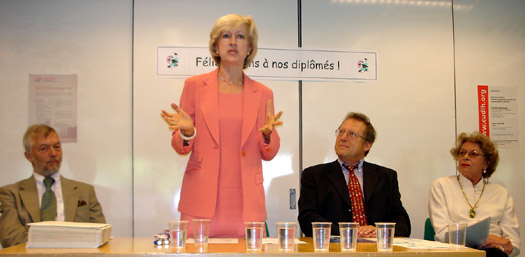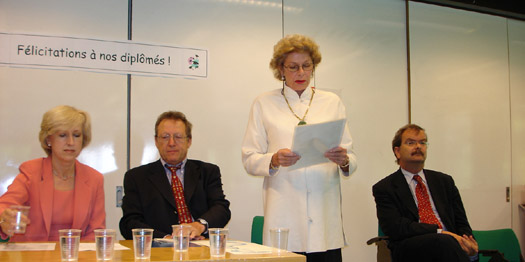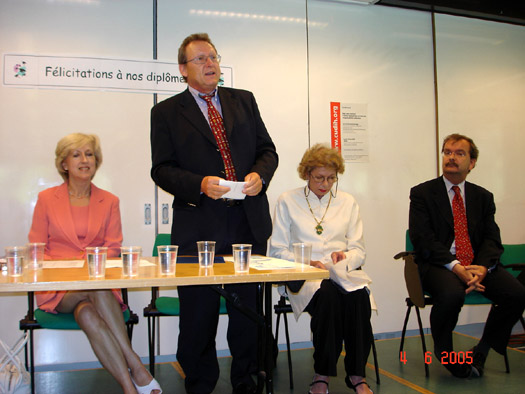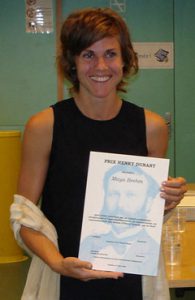
On Saturday 4 June 2005, the Henry Dunant Prize Foundation awarded the 2005 Prize to Mrs Maya Brehm for her thesis for a diploma in advanced studies presented as part of her studies at the University Centre for International Humanitarian Law (CUDIH): Conventional Arms Transfers in the Light of Humanitarian Rights Law.
This thesis concerns the dangers presented by the current proliferation of arms throughout the world and mores specifically, analyses the legal instruments to deal with this phenomenon. Having outlined the limits of the law in terms of arms control, the author goes on to examine to what extent international humanitarian law and the international human rights law are able to effectively limit the transfer of arms. She then puts forward the case for a need to create a specific treaty on the international transfer of arms and discusses the draft convention proposed by a group of non-governmental organisations and supported by some governments.
The jury suggested that Mrs Maya Brehm be awarded first prize because her work was of an extremely high academic level and because it related to a proposal that could have a real impact on international events. In particular, the committee was impressed by the analysis which, while performed with the necessary scientific objectivity, clearly expressed the author’s personal beliefs. Finally, the issue was handled with a legal rigour which could advance the ideals of Henry Dunant, through law. Read the thesis and its appendices (Adobe pdf format).
Update (September 2016)
Since her reception of the Henry Dunant Award in 2005 for research on the legal regulation of arms transfers, Maya Brehm has worked as a protection delegate with the International Committee of the Red Cross (ICRC) and as a researcher at the UN Institute for Disarmament Research (UNIDIR). Her work at UNIDIR focused on the protection of civilians from the use of explosive weapons in populated areas. In 2013, Maya joined the Geneva Academy of International Humanitarian Law and Human Rights. She is the Academy’s lead researcher on weapons law issues and presently conducts research into human rights and humanitarian concerns raised by increasing autonomy in weapon systems. Maya is also a lecturer at the Geneva Centre for Education and Research in Humanitarian Action (CERAH) and works as a consultant with civil society organizations in the field of humanitarian disarmament. She is co-founder of the Swiss branch of the International Campaign to Abolish Nuclear Weapons (ICAN Switzerland), member of the scientific board of the Association of Swiss Lawyers for Nuclear Disarmament and president of the committee of the Geneva Disarmament Platform. For more updates, follow her on twitter.
Gloria Gaggioli and Philip Grant
Exceptionally, the jury suggested that a commendation be awarded ex-aequo to two works of major interest. Furthermore, their authors each receive a thousand francs from the Ousseimi Foundation, represented at the Henry Dunant Prize 2005 award ceremony by professor Gérard Bourquin. The Ousseimi Foundation gives aid to deserving students who do not have the financial means to finish their studies.
Gloria Gaggioli
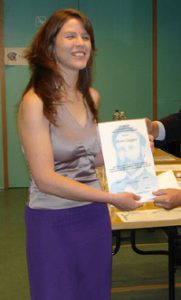
Mrs Gloria Gaggioli’s thesis for a diploma in advanced studies is entitled: “The Role of International Humanitarian Law and Human Rights in Exercising the Security Council’s Peacekeeping Powers”. This thesis analyses the dual role of international humanitarian law and the international human rights law in relation to the United Nations Security Council. On the one hand the Council promotes both of these fields. On the other, these two fields limit the powers of the Council.
The prize was awarded to this thesis due to its extremely good academic standard, the huge domain that it covers and the innovative analysis of the Security Council’s quasi-legislative solutions, a problem that remains highly topical. The Committee is convinced that this thesis contributes to the understanding of the significance of humanitarian law and human rights in terms of political action at the highest global level.
Read the thesis (Adobe pdf format).
Philip Grant
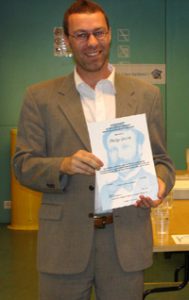
Mr. Philip Grant’s thesis is entitled: “Towards the End of International Criminal Tribunals for Former Yugoslavia and Rwanda: Legal Consequences of Time Constraints”. This thesis is devoted to the various measures taken or planned by criminal tribunals to end their mandates as quickly as possible, as they are requested to do by the United Nations Security Council. It analyses the practical effects of these measures in light of international criminal law and the international law on human rights.
The prize was awarded to this thesis due to the remarkable legal precision of the analysis, the exhaustive treatment of the problem and the excellent knowledge of international criminal law and human rights demonstrated by the author.
Read the thesis (Adobe pdf format).
The prize was awarded on Saturday 4 June 2005.
Update (September 2016)
After receiving an accessit to the 2005 Dunant award, Philip Grant continued to work in his law firm at the same time as residing over TRIAL International, a Geneva-based organisation active in the fight against impunity and offering legal support to victims of genocide, crimes against humanity, war crimes, torture, enforced disappearances and sexual violence and. As of 2007, he became TRIAL International’s Director, a position he has held since, contributing to the growth of the organisation, which now runs projects on three continents. Under his leadership, the organisation has litigated and won dozens of cases, representing hundreds of victims before both national and international courts and human rights bodies.
Photos de la cérémonie
